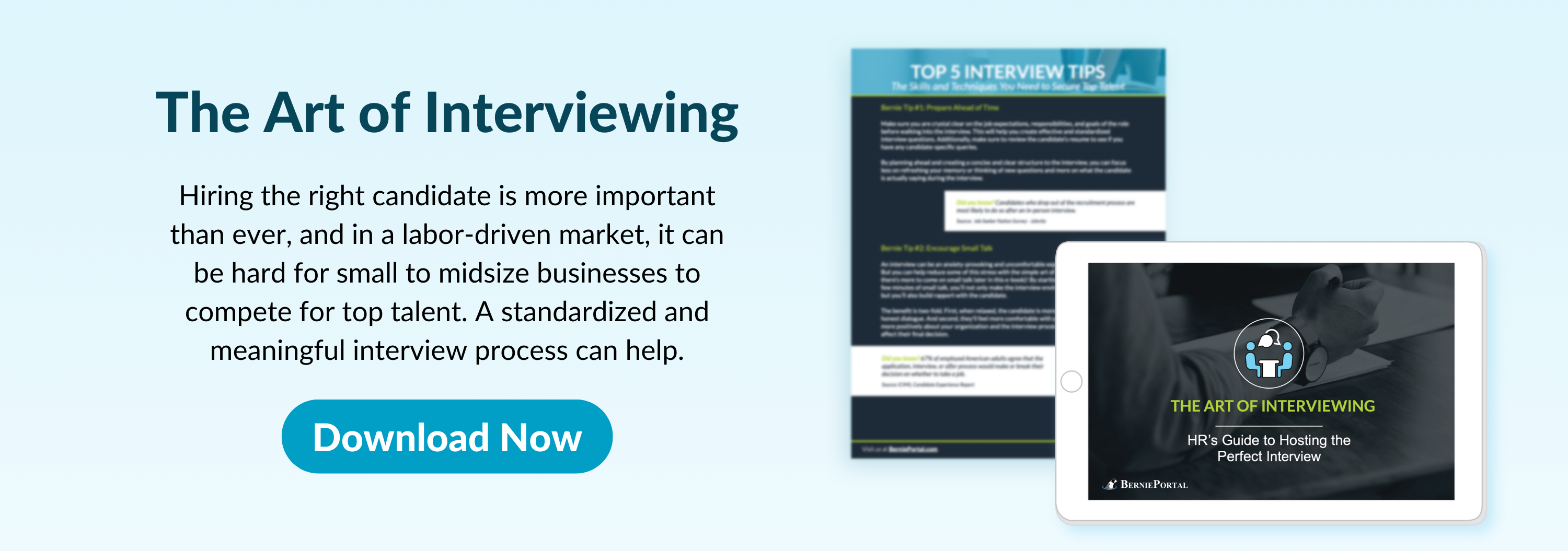
Written by
Aidan Farrish
Aidan is an aPHR-certified writer on the marketing team at BerniePortal. She writes about HR, healthcare, and benefits.
Social Media “Career Coaches” Are Giving Your Workforce Bad Advice

Social media tells people many things—and we all know that some of it is likely false. The most popular videos flashing across your workforce’s feeds offering career coaching are riddled with falsehoods and, frankly, bad advice.
But while you may be able to identify what’s worthwhile advice and what isn’t, your employees and candidates don’t have the same broad perspective as an HR professional. So, it won’t stop them from watching videos online telling them to use a competitor’s offer to negotiate a raise. And this is growing more common!
Let’s identify the sources of the bad advice and establish why it’s so unreliable.
Popular Social Media Platforms for Influencers to Share Work Advice
The most common social media platforms among Gen Zers and Millenials, who are most likely to be listening to career coaches online, are Instagram, TikTok, and Twitter. These platforms are home to many kinds of content, from sports clips to gardening hobbyists. They are also the most popular platforms used by work-related “influencers” who style themselves as career coaches for the modern workforce—AKA, everyone you will be interviewing within 5 to 10 years.
“Influencers” are people who have curated content, whether that’s video clips like TikTok or images for Instagram, based on a specific style or niche. For example, you may be familiar with lifestyle influencers who share their favorite Amazon products, skincare routines, or recipes.
You can find influencers on any platform. Your employees, especially Gen Zers or Millennials, can likely name a few influencers they are familiar with on multiple platforms. Successful influencers gain large followings spread across numerous platforms, and their audience is encouraged to share content and attract more interested viewers. So, while one platform may have many more influencers of a particular niche, the audience will naturally flow between all interconnected platforms on which the influencer has a presence.
Why is this relevant? Because influencers are creating much of the poor advice trusted by your current (and future!) workforce.
What Aren’t Career Coaches on Social Media Reliable?
The most common kinds of advice influencers share on social media platforms on work or career-related topics, also called “CareerTok,” are scripted responses or conversation starters. The scripts range from how to ask for a raise to how to decline a project.
To clarify, not all of the scripts are bad. But most are. A lot of the reason so much of it is bad is because the people sharing advice have only been in the workforce for a decade, maximum—but usually less.
So, we have influencers working in the office for five or so years, during a world turned upside down by COVID-19, most likely, and then collating their work experiences into digestible chunks that appeal to an audience that scrolls past content an average of every six seconds.
Let’s look at that as a list. The average influencer telling your employees how to get ahead in the workplace are:
- Under the age of 35, but usually under the age of 30
- Most likely to have worked during COVID-19, which set unrealistic expectations
- Speaking from their experiences, which are unlikely to range across industries or between multiple positions, much less from a place of seniority
- Creating content that is meant to be absorbed as quickly as possible
Online Career Coaches Tend to Be Younger
Age doesn’t always equal experience, but when it comes to career coaching, it’s a much closer relationship.
An article from BBC explains that many Millenials and Gen Zers seek career influencers, or coaches, who are seen as peers, due to their content and approach being more relatable. The article also describes the average career influencer: under the age of 30.
This demographic being seen as the ultimate source of information and advice for career progression has numerous pitfalls, as a 25-year-old’s peer is just that: 25. How can someone speak on a topic as an expert when they lack experience?
That’s the big kicker: social media platforms do not discriminate against what niche influencers choose to speak about, meaning that self-proclaimed experts are the ones who may gain popularity—and your workforce’s attention. An intelligence consulting company, Morning Consult, reports that 53% of Gen Zers believe that becoming an influencer is a reputable job choice, and 57% said they would become an influencer if given the chance.
Online Career Coaches Began Their Careers During Tumultuous Times
Meghan M. Biro, an HR expert and consultant on recruitment, confirms that many Gen Zers began work during COVID-19. She clarifies,
“Some began their professional careers (if they have started them already) as remote employees; others found themselves victims of layoffs as companies shed their last hires in an effort to stay afloat during the economic downtown.”
If career coaches are advising their audience (your workforce) on career progression, then this is the experience they are speaking from—remote work, remote schooling even, and a severe economic downturn. And while the world of work has changed irrevocably, the shift back into the office is more pronounced than ever.
Are All Social Media Accounts Bad?
Social media platforms are run by proprietary algorithms that determine what lands on a user’s feed based on metrics such as the popularity of the person’s profile, the number of impressions the content generates, if the content’s topic is trending, etc. While ideally, the trendiest educational or advisory content is created by a user with deep knowledge of that topic, that’s not often the case.
There are outliers to this fact. For example, The Cincinnati Zoo has an official presence on TikTok and often posts clips and informational content about animals. It’s trustworthy, factual, and well-researched. However, the average person posting career advice is probably not reliable, and there isn’t a great way to determine the validity of their experiences unless they are a recognized name in the field.
For more information on how you can learn to recognize and preemptively respond to how employees attempt to use bad social media advice, check out our HR Party of One episode covering how TikTok, in particular, might be the source of your recent headaches.
Additional Resources
You can stay informed, educated, and up to date with important HR topics using BerniePortal’s comprehensive resources:
- BernieU—free online HR courses, approved for SHRM and HRCI recertification credit
- BerniePortal Blog—a one-stop shop for HR industry news
- HR Glossary—featuring the most common HR terms, acronyms, and compliance
- Resource Library—essential guides covering a comprehensive list of HR topics
- HR Party of One—our popular YouTube series and podcast, covering emerging HR trends and enduring HR topics

Written by
Aidan Farrish
Aidan is an aPHR-certified writer on the marketing team at BerniePortal. She writes about HR, healthcare, and benefits.




Submit a Comment